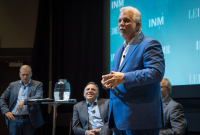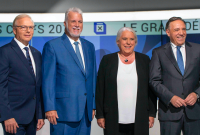Support strong Canadian climate journalism for 2025
At a downtown Montreal hotel last week, Quebec solidaire co-spokesperson Manon Masse looked out at members of the city's business community and calmly declared she wanted a revolution.
Across Canada, many political parties at the provincial and federal level have less-than-mainstream views. But in Quebec, Masse's "revolutionary" party held three seats in the legislature at dissolution, has a good chance of winning more on Oct. 1 and has become a fixture in televised leaders' debates.
In a campaign where sovereignty is not a defining issue, the prominence of Quebec solidaire is just one example of how the election remains a distinctly Quebec affair. Issues of Quebec identity have dominated the campaign. There is broad consensus on the need to cut carbon emissions. And none of the main parties can be considered traditionally conservative.
Masse's Sept. 19 speech was the first time a Quebec solidaire leader had been invited to address the Montreal Board of Trade, the embodiment of the capitalism her party pledges "to leave behind." Board president Michel Leblanc got right to the point, asking her if her party is "socialist revolutionary."
"Revolutionary — certainly," Masse responded.
She balked at the "socialist" label, but Quebec solidaire's platform includes the total or partial nationalization of Quebec's banking system as well as its mining and forestry industries. Its financial plan seeks to collect almost $13 billion more a year from the "super-rich" and large corporations.
Even its leadership structure diverges from politics as usual: there are no "leaders" in Quebec solidaire. Rather, the party has one female and one male "spokesperson."
Identity has been a recurring theme in the campaign. Francois Legault, leader of the Coalition Avenir Quebec, is running on reducing immigration to the province and expelling newcomers who cannot pass French-language and Quebec values tests three years after arriving.
All main parties except the Liberals want to prohibit state employees in positions of authority from wearing religious symbols.
"We have the right to defend our values," Legault said recently when challenged on his policy to prohibit police officers from wearing the hijab.
"We even have the duty to do so as Quebec premier, to defend our identity."
For his part, Parti Quebecois Leader Jean-Francois Lisee is proposing to force anglophone junior-college students to attend a francophone institution for one semester.
While those divisive positions might disqualify political leaders elsewhere in the country, francophone Quebecers are highly attuned to their demographic weight inside the province and within Canada.
The preservation of the French language and the Quebecois culture is almost primordial, says Jan Doering, a sociology professor at McGill University.
"There is a stronger wish of the Quebecois to root themselves in a shared history, compared with the rest of Canada," said Doering, who is orginally from Germany and whose research focuses on issues of race, ethnicity and migration.
And while the Quebec election might be unique in the country in that regard, Doering said it is similar to European campaigns where "concerns with immigration, integration and how to maintain identities" are common.
"That's something I saw very little of in (Ontario)," he said. "I think Quebec is more normal — just not in the Canadian context."
The economic and social concepts of "right" versus "left" are also different in Quebec.
Leaders rarely talk of personal responsibility and small government; instead, all four major parties champion a strong state with a responsibility to take care of its people with well-financed public institutions.
Legault's Coalition promises to lower taxes and reduce bureaucracy in the civil service, and the Liberals under Philippe Couillard promise to continue balancing budgets — but both are careful to avoid sounding too enthusiastic about a greater role for the private sector.
Michel Magnan, the Stephen A. Jarislowsky Chair in Corporate Governance at Concordia University, says Masse's party might be considered far-left in 2018, but many of its ideas have roots in the European socialist parties of the 1960s and 70s, as well as the federal NDP.
Since then, he said, traditional European socialist parties have abandoned earlier commitments to nationalize industry. And in 2013, the NDP voted to remove most references to "socialism" from the party's constitution, including the support of "social ownership."
"It's almost like we're in a time warp here," Magnan said about Quebec solidaire.
Quebec's distinctiveness is also reflected in the four parties' approach to protecting the environment.
The only party that dares suggest Quebec exit the carbon market is Quebec solidaire — but that's because it thinks the cap-and-trade system is too capitalist. None of the major party leaders have shed a tear for the recently cancelled Energy East pipeline project that was to transport crude from Alberta, through Quebec, to New Brunswick.
Back at the Board of Trade, Leblanc said his members wanted to invite Masse, in part, because her party was consistently polling above 10 per cent in opinion polls and they were curious.
"The business community doesn't think she'll form the next government ... but the ideas in her program would have, potentially, a very negative impact on investment decisions, decisions for job creation," he said. Nonetheless, the audience was courteous.
"There were people who clapped," Leblanc said. "I would say, some out of politeness, and others because there were members of her party who came and were happy with her speech."





Comments